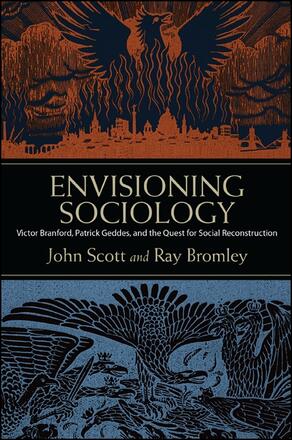
Envisioning Sociology
Victor Branford, Patrick Geddes, and the Quest for Social Reconstruction
Alternative formats available from:
Open access edition available from:
Examines the continuing relevance of early British sociologists Victor Branford, Patrick Geddes, and their associates.
Description
Envisioning Sociology is a landmark work, the first major study of the founding of sociology in Britain and the enormous contributions made by the intellectual circle led by Victor Branford and Patrick Geddes. Authors John Scott and Ray Bromley chronicle the biographical connections and personal partnerships of the circle's key participants, their international connections, their organization-building work, and the business activities that underpinned their efforts. Branford and Geddes fashioned an ambitious and wide-ranging interdisciplinary vision, drawing on geography, anthropology, economics, and urban planning, in addition to sociology. This vision was an integral part of a project of social reconstruction, a "third way" eschewing both liberalism and communism in favor of cooperation, redistribution, and federalism. Envisioning Sociology uncovers a previously hidden history of the social sciences, giving readers a fascinating glimpse into early twentieth-century social science and political economy, while demonstrating the contemporary relevance of the ideas of these underrated figures. Although Branford and Geddes failed to establish the grand sociology they envisioned, their ideas helped develop the theory and practice of community development, participatory democracy, bioregionalism, historic preservation, and neighborhood upgrading.
SUNY Press has collaborated with Knowledge Unlatched to unlock KU Select titles. The Knowledge Unlatched titles have been made open access through libraries coming together to crowd fund the publication cost. Each monograph has been released as open access making the eBook freely available to readers worldwide. Discover more about the Knowledge Unlatched program here: https://www.knowledgeunlatched.org/, and access the book online at the SUNY Open Access Repository at http://hdl.handle.net/20.500.12648/8479
.
John Scott is Professor of Sociology at Plymouth University in the United Kingdom. His many books include Sociological Theory: Contemporary Debates, Second Edition; Conceptualising the Social World: Principles of Sociological Analysis; and Sociology, Fourth Edition (coauthored with James Fulcher). Ray Bromley is Professor of Geography and Planning at the University at Albany, State University of New York. His books include Planning for Small Enterprises in Third World Cities.
Reviews
"By reviving the ideas of these two largely forgotten pioneers of British sociology, Scott and Bromley have made a significant contribution toward understanding the true complexity of the growth of sociology in the early twentieth century." — Contemporary Sociology
"…Branford and Geddes' work and that of the Sociological Society deserves recognition and Scott and Bromley's research would be a great platform for introducing them in a freshman level sociology course." — International Social Science Review
"Scott and Bromley are illuminating and sure-footed about the intellectual field that spawned the [sociological] Society. Theirs is surely an exhaustive account of the group's contribution to social reconstruction, politics, planning, civics, culture and education and, above all, sociology." — Sociological Review
"…a significant contribution … the most substantial effort to date to recover the life and work of a circle of early twentieth-century thinkers … punchy and highly readable." — Journal of the History of the Behavioral Sciences
"…a valuable book which will be of interest to a wide variety of scholars of the intellectual history of the later Victorian period." — Journal of Victorian Culture